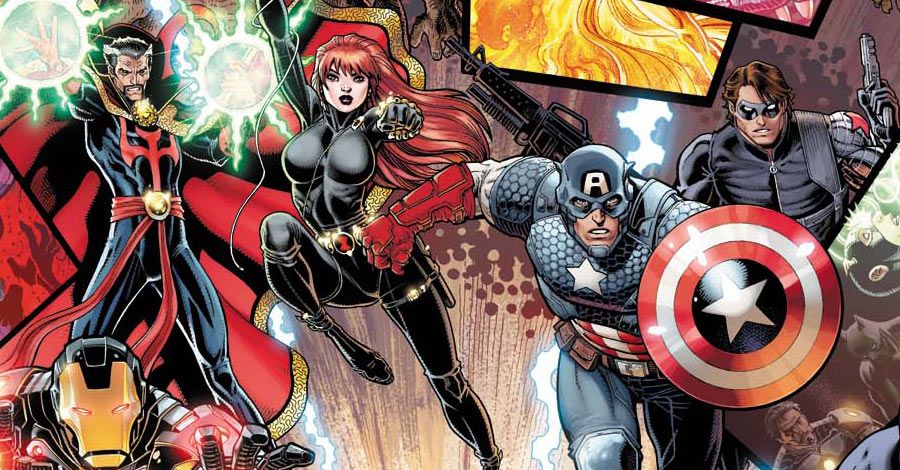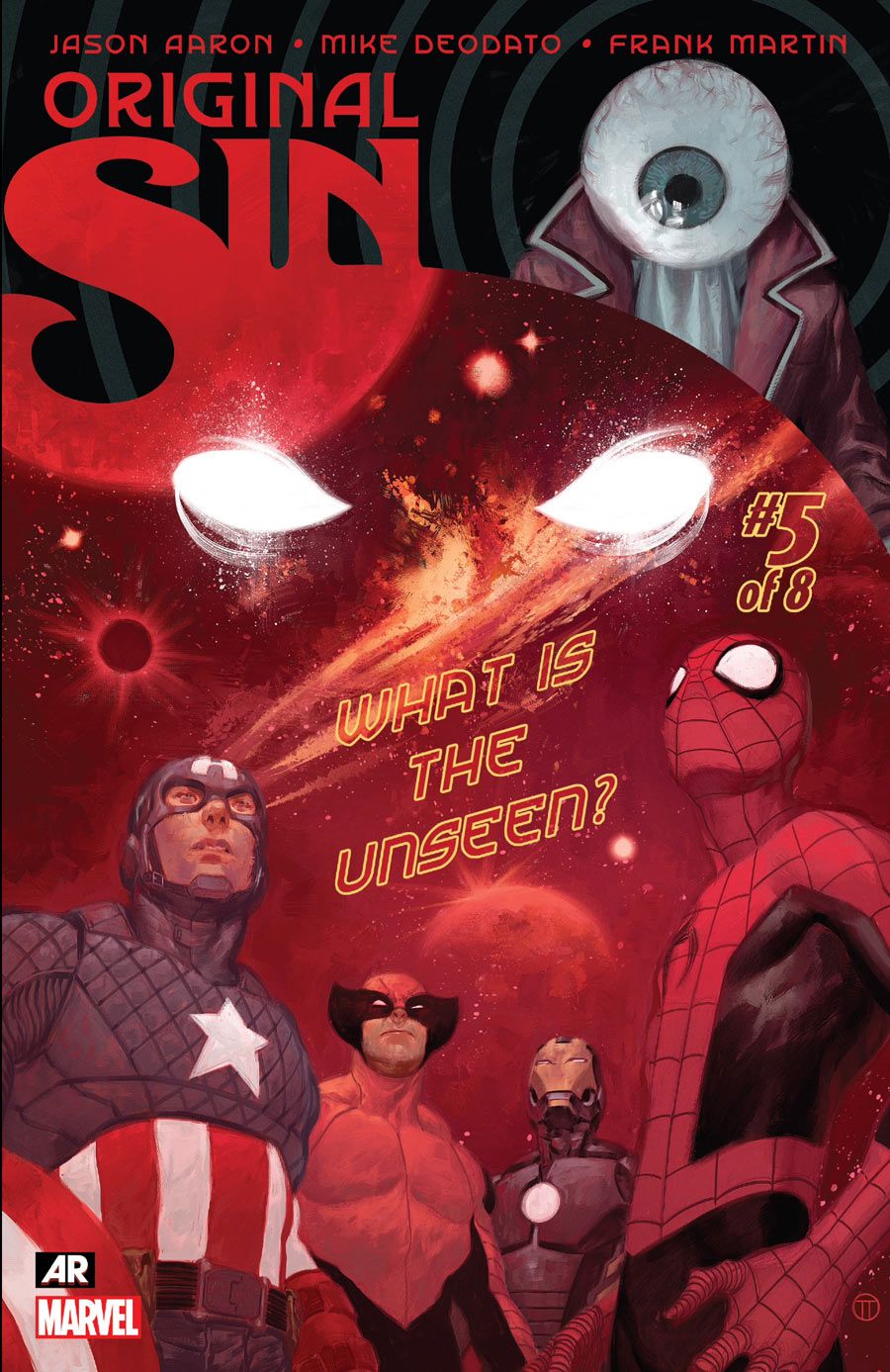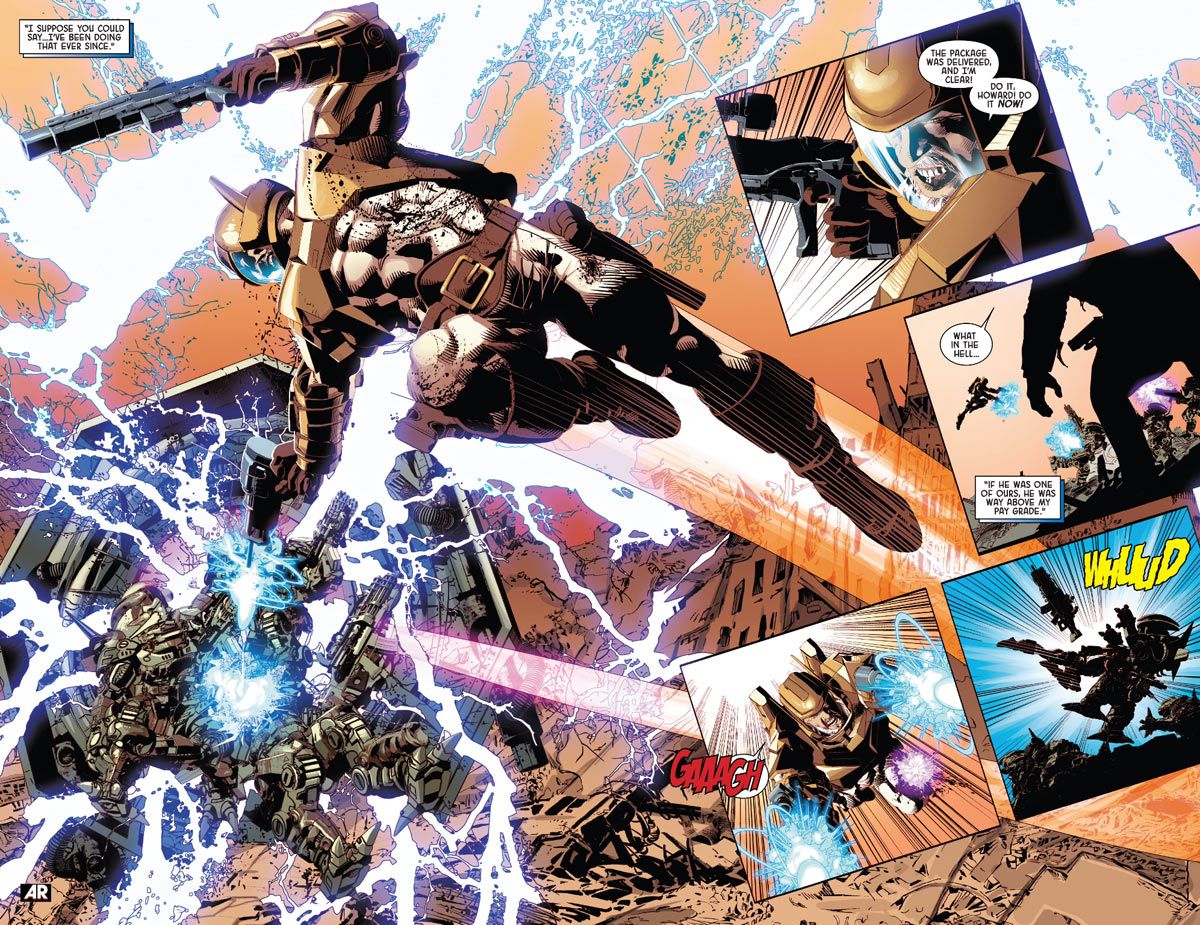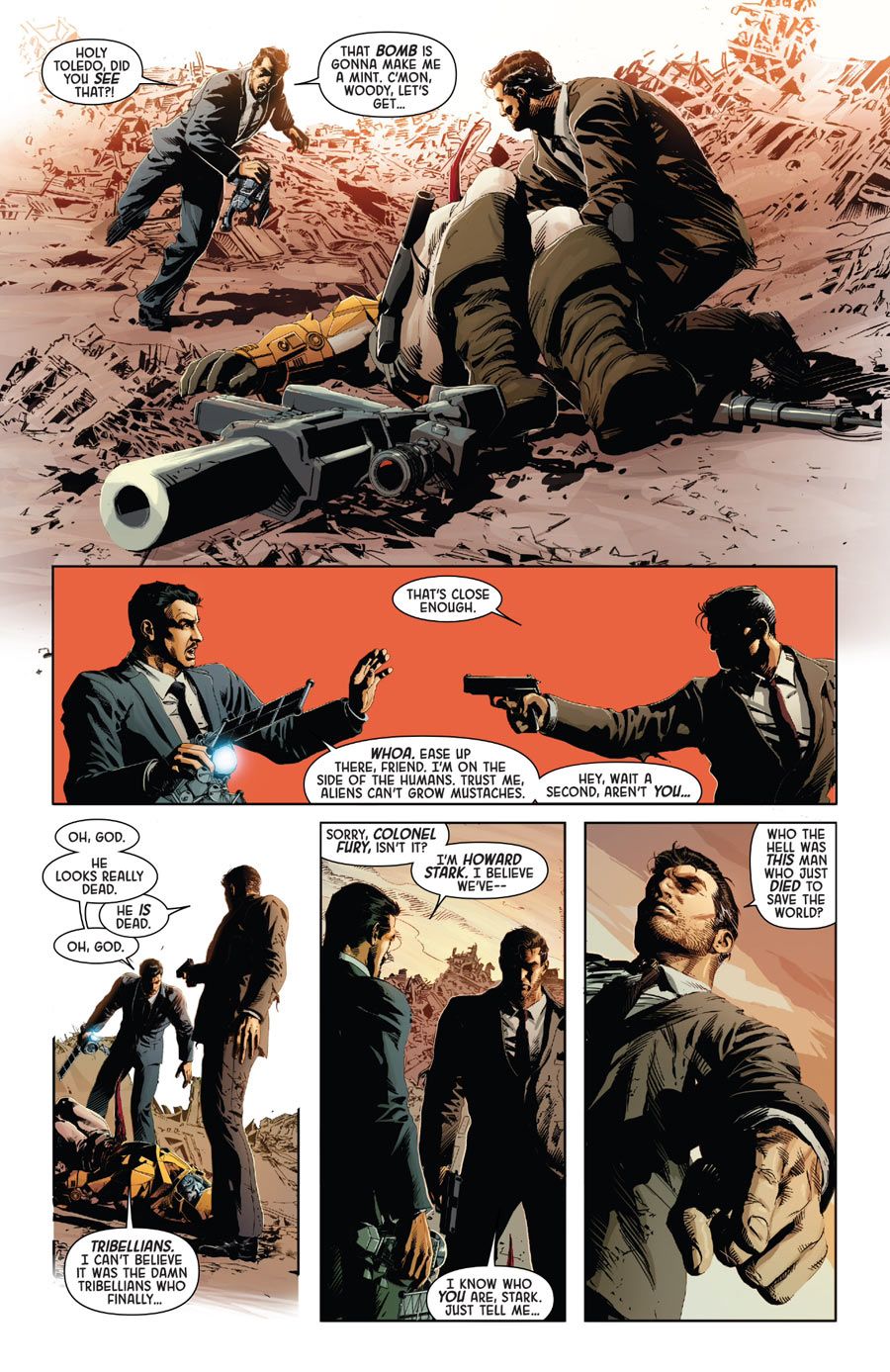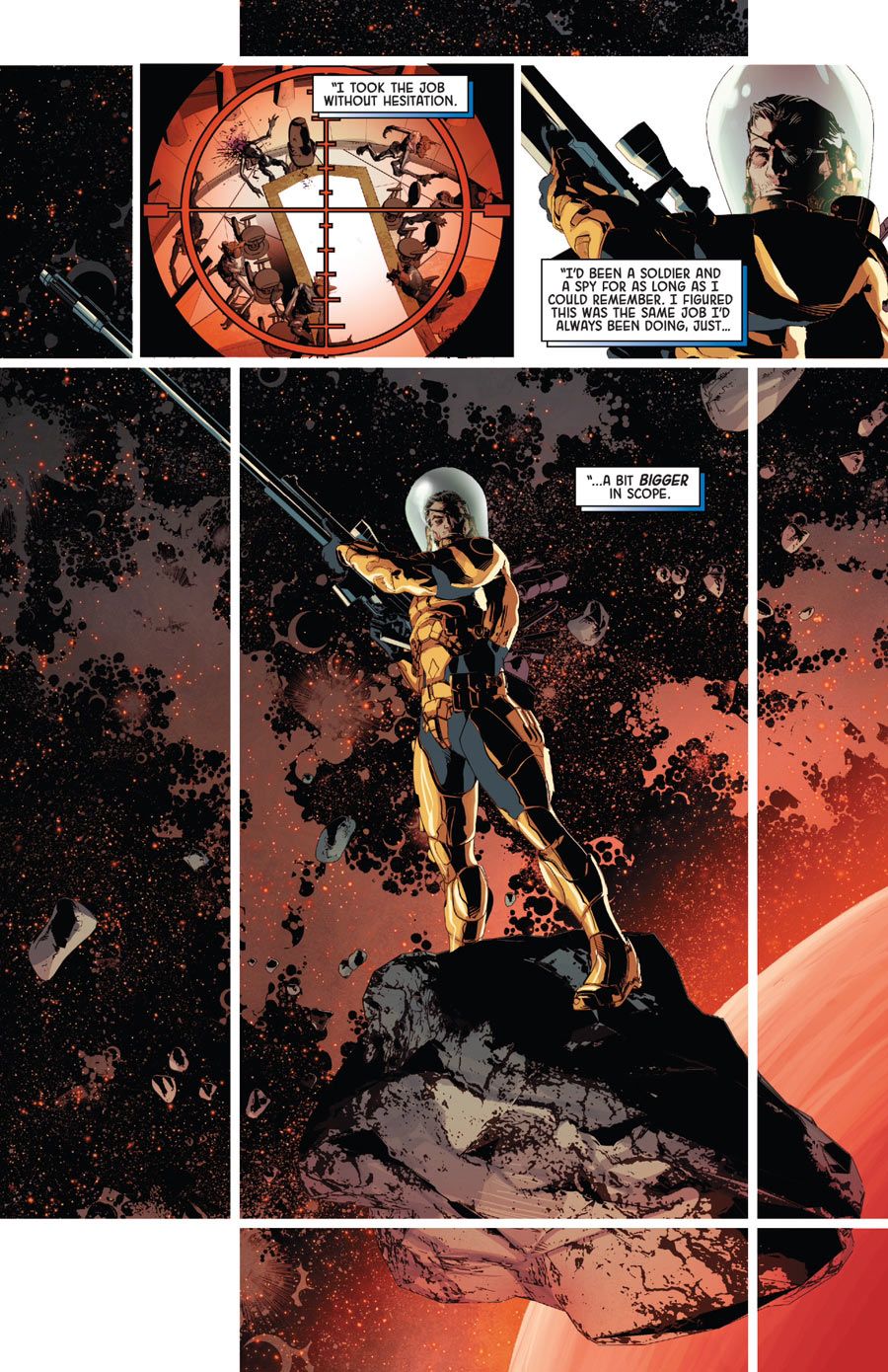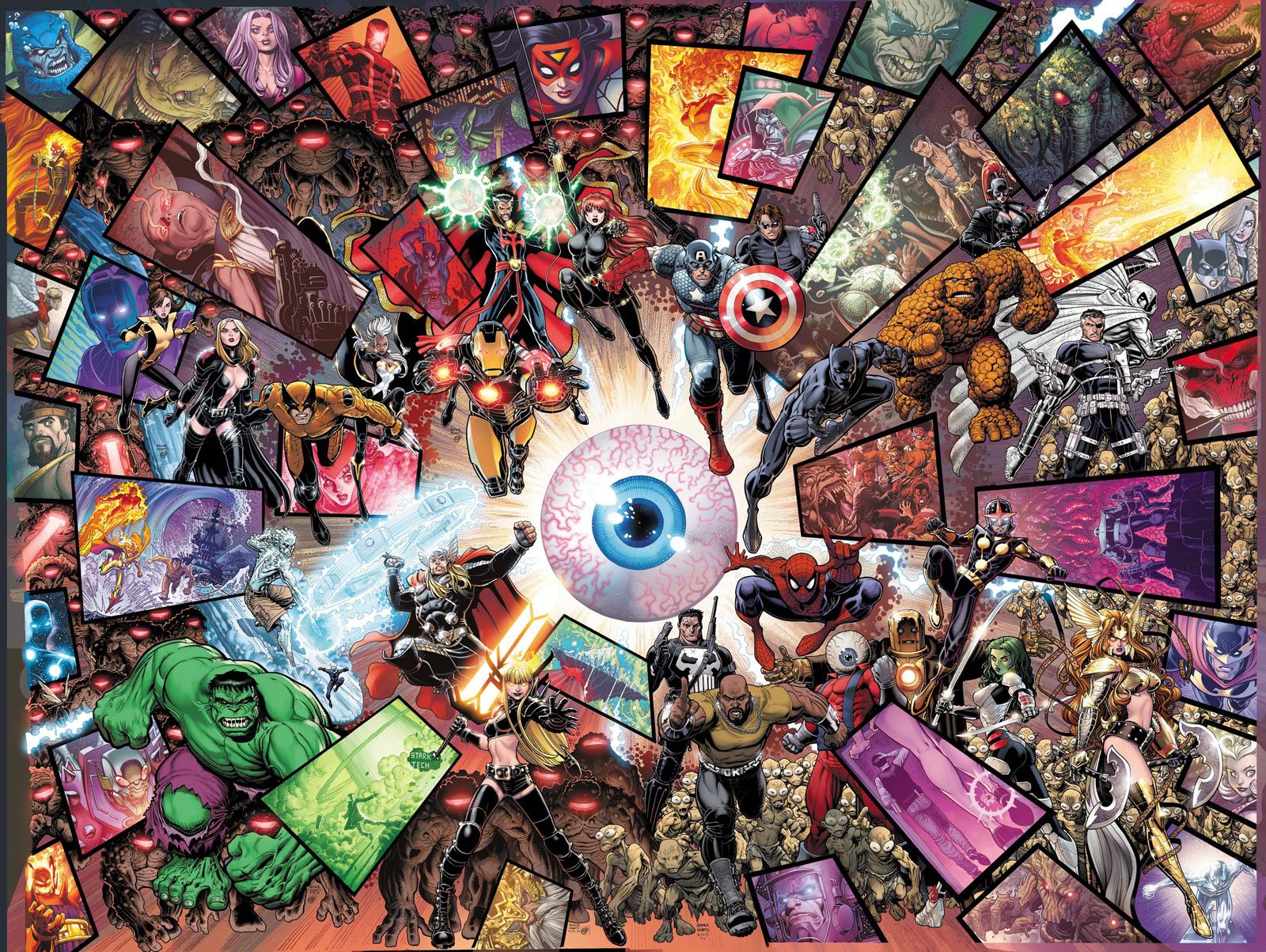Many of Marvel's superheroes wage a secret war against crime, unable to tell the world about how they saved it or the horrors they faced doing so. And then there are the super spies, whose clandestine world-saving operations often require them to make morally murky choices. They may be able to share their experiences with a select number of people with the right security clearance, but not every assignment has such a group in the loop.
In "Original Sin" #5, the heroes investigating the murder of the omniscient alien known as the Watcher discovered that decades ago, Nick Fury was tasked with being the one person to preemptively identify and eliminate threats to Earth -- with extreme prejudice.
MURDER MOST COSMIC: Aaron & Brevoort Dig Into "Original Sin" #4
In our latest installment of MURDER MOST COSMIC, a series of post game chats about each issue of Marvel's "Original Sin" event, writer Jason Aaron and Marvel Executive Editor and Senior Vice President of Publishing Tom Brevoort join us to offer some insight into Nick Fury's story of how he became the sentinel and sole line of defense for Earth, hints of what this may or may not have to do with Jonathan Hickman's long-delayed "S.H.I.E.L.D." series and the introduction of Woodrow McCord,while offering glimpses of what's yet to unfold as the high stakes murder mystery continues to unfold in the issues ahead.
CBR News: I want to begin our discussion of some of the big revelations of this issue with perhaps the biggest: Nick Fury, in addition to running the world's biggest spy agency., was also a freelance soldier and assassin equipped by what looks to be the ancient S.H.I.E.L.D. organization that we first saw in writer Jonathan Hickman's "S.H.I.E.L.D" series. Is that correct?
Tom Brevoort: You're drawing some conclusions and making some leaps that I'm not willing to grant you are correct. In the broadest sense, though, yes, we are showing that Nick has, for a very long time, unbeknownst to anybody, been acting in a solitary capacity as the unknown sentry and guardian of the Marvel Universe, and the Earth in particular; fighting off and taking care of situations before they boil over and become a threat to our world. He inherited that mantle from the late Woodrow McCord and was helped at least a little bit by Howard Stark in that capacity.
So even though Howard Stark may have been an agent of the ancient S.H.I.E.L.D. organization, that doesn't necessarily mean there were any sort of ties between Nick and that group.
Brevoort: Unless it's on the page, it's not on the page. [Laughs] I hate to be coy about this stuff, but as I've said in every one of these interviews, because this is a murder mystery, I don't want to eliminate any possibilities as we go.
Jason Aaron: Issue #5 is titled "The Secret History of Colonel Nicholas J. Fury," and that's pretty much what you get. If you've read a lot of Nick Fury stories over the years, I don't think these revelations would be particularly shocking or feel like they've come out of left field. These are the kinds of things we've always assumed that Nick Fury has been doing over the years, just on a different scale.
We know he's assassinated foreign leaders and participated in coups. I don't think that stuff is particularly shocking, because that's kind of what the C.I.A. has done over the years. That's kind of what Fury was modeled after. So we're taking that and playing it out on a cosmic level, an other-dimensional level, and really, on the scale of the Marvel Universe.
Who came up with the idea of putting Nick Fury is this role as watchman of Earth?
Aaron: I don't know. This was just something that grew out of the core "Original Sin" idea. In some sense, this is Nick Fury's original sin. "Original Sin" was always going to be about these secrets coming out. We're starting to see that in all the tie-ins. All the Marvel characters have these weird, dark secrets that are coming out from their past, and this is Nick Fury's secret.
Nick picks up this duty after his predecessor Woodrow McCord is killed. Is McCord the brand-new Marvel character you've been hinting at?
Brevoort: He is indeed.
Aaron: Yes.
So I assume that even though he appears to perish in this issue, we will see more of him.
Brevoort: You will certainly see more of him in the future. Whether or not that will be in "Original Sin"-proper or not is another story.
Is whether or not he's definitely dead or is staying dead another story as well? Because it's unusual to have a new character appear and then die a couple pages later.
Brevoort: Right. Again, I don't want to rule out any possibilities for anybody. I don't want to say one way or the other. All I will say is, we're definitely talking about doing more things with that character. So make of that what you will.
Aaron: Even though he's only around for a few pages, I think you get the idea that this guy has a pretty long history. He's been up to a lot of different stuff. Then, once Howard Stark brings Nick Fury into this role, you get the idea that this is even bigger than just this one guy; that this has probably been going on for a long time.
Howard Stark's appearance is the latest example of how the time period between the end of World War II and the the beginning of the present day Marvel Universe is rife with stories. In recent years, we've seen a number of stories from that era. Will we continue to see more from that time period in ongoing books, or perhaps a "Marvels" type of miniseries?
Brevoort: I don't know if we'll see a project specifically devoted to that. That was really Jonathan [Hickman's] "S.H.I.E.L.D." book more than anything. So when the last few issues of that book come out, you'll see some stories from that time period in those books. It's certainly proven to be a fertile period in time. We've found some story material there and hopefully made good use of it.
In "Original Sin" #5, Howard Stark knows that there are many alien races out there with ideas and designs for Earth. That may have some readers wondering when the story we see with him and Nick Fury takes place in relation to the events in "The Secret Origin of Tony Stark" storyline in Kieron Gillen's "Iron Man." Which story takes place first?
Brevoort: I'd have to do a quick double check, but I think the flashback in "Original Sin" #5 has to take place before "The Secret Origin of Tony Stark." If for no other reason than that Tony is not that old. If Tony is 40 today, and I don't think he is, "The Secret Origin of Tony Stark" can't really have taken place before the 1970s, even though it had the trappings of the '60s.
Aaron: I think if nothing else we've determined that all those Marvel characters from the '50s and '60s lived longer back then. Everybody who was around back then was pretty healthy and lived quite awhile. [Laughs]
Brevoort: [Laughs] Yes, they were putting something in the water.
[Laughs] Maybe the Infinity Formula?
Brevoort: [Laughs]
Aaron: [Laughs] Yes, the Infinity Formula was in everything. It was like how cocaine was in Cocoa-Cola. They just put Infinity Formula in all their foods and beverages.
Let's move into the people that were helping Nick carry out his missions as a cosmic spy over the years. It appears that his army of LMDs served as his support staff. Is that correct?
Brevoort: At least so far as we've seen.
Aaron: Yeah. As Fury says, he didn't really trust anybody else with this job. This was a one-man job. There was no crossover with his various day jobs or with the other superheroes. He kept this to himself. Really, the only other person he would trust was himself, so he used his own group of LMDs. These were presumably not the same type of LMDs running around at S.H.I.E.L.D. -- these were a different breed of LMDs that Fury used for these jobs.
It's clear from his dialogue that Fury believed in what he was doing, but what sort of psychological impact do you think that would have on him? He had to do some dark, morally murky things, and the only person he could discuss them with was basically himself.
Aaron: You might say that could drive you a little bit crazy.
Brevoort: [Laughs]
Aaron: I think we're already seeing characters looking at Nick Fury and basically saying, "This is insane. You've turned into Kurtz from 'Heart of Darkness.' You've lost your mind. You've been playing judge, jury and executioner for years and years. You're surrounded by robots that look exactly like you. This is absolutely crazy. You are the bad guy in this situation, and you need to be stopped."
I got the feelings that these LMDs may look like Nick, but they're not always exactly him in terms of things like personality and scientific aptitude.
Aaron: Yes, it all depends on what they were programmed to do. We saw an LMD in the first few issues of "Original Sin" that seemed to believe it was Nick Fury. That's why it was able to make some of the comments that it made.
Brevoort: Like the ones about the steak in issue #1.
Aaron: Exactly. So for all intents and purposes, it was Nick Fury.
These revelations, of course, beg a few questions -- how did Nick Fury become so old that he could not fulfill his duties as the watchman of Earth? And if he's not performing those duties now, who is?
Aaron: Despite his current appearance and state, Nick is still struggling to do the job. We'll talk a little more next issue about what's happened to Nick. There are still several questions to be answered, like why is he so old?
So we'll talk about that next issue, but at this point, this is still Fury's job. He still thinks it is his responsibility.
We've of course have to wonder how truthful Nick is being with the story he tells us, because the Orb accuses him of not telling the complete truth. Is the Orb saying Fury is lying by telling untruths? Or is he accusing him of lying by omission?
Brevoort: I think any time you're dealing with a spymaster like Fury, or the Black Widow, or anybody that's in that line of work, there's got to be a level of distrust towards what they say. These characters' lives and careers are built around being duplicitous. That gives them a leg up and a strategic advantage over everybody, be they friend or foe. It becomes kind of a way of life.
So I think anybody that assumes that Nick is ever 100 percent forthcoming inevitably learns there's more to his story than what they're initially told, and that he's not always as forthcoming as you may want, because that's the job he has.
Aaron: He told this long story for an entire issue and didn't really answer anyone's questions.
Brevoort: [Laughs]
Aaron: All these characters are asking him, "Why are we here? What's going on? Why are you so old? What happened to the Watcher? Isn't that why we all got together?" And Fury is like, "Let me explain everything." He then proceeds to tell a long story about him killing aliens and monsters. By the end they're still saying, "Okay, that's good to know -- but it still doesn't answer any of our questions."
[Laughs] Off the top of my head, I can't think of an example of a cosmic spy comic, but man did Mike Deodato's work on this issue make want me to see more of that genre.
Brevoort: Yes, it's a good example of why Deo was such a great choice for this, because he can draw the vastness of the Marvel Universe, and he can draw the sort of shadowy, more clandestine, more grounded material and convey the tone, the mood and noir sensibility that a story like this requires. He can draw a scene where a guy shoots a horse-alien from atop an asteroid out in space with a gun that shoots bullets through the atmosphere, and it doesn't just look cool, it all looks right. It all looks plausible.
Aaron: Are you saying it's not plausible?
Brevoort: [Laughs] I think it's very plausible!
Aaron: Why didn't you mention that when I was writing the issue, Tom?
Brevoort: [Laughs] I went with it. Deo really has the perfect set of skills and certainly rose to the challenge of all the crazy stuff that he's had to draw over the course of this series in its entirety, and this issue in particular. There's some wonderfully crazy stuff, and yet at the same time, he's just as good at executing a sequence where it's Nick, on a rooftop in Manhattan, considering whether or not he should shoot the young Spider-Man out of the sky.
Jason, what sort of notes did you give Mike for McCord and the alien races that appear in this issue?
Aaron: Not much. There was just a little description, and Mike kind of grabbed what I had and went crazy with it. I didn't write that the aliens that Fury assassinates should look like evil cows. [Laughs] That was all Mike. McCord was sort of a 1950s-style rocketeer superhero, and Mike really brought everything else to that.
From the first outline of "Original Sin," this was one of the issues I was excited to get to, because I always knew, eventually, we would do a Nick Fury flashback issue where he tells his story. I was excited to get to the point where we could have Nick Fury in one of those Steranko space suits, shooting people in outer space.
Finally, what can you tell us to help prepare for "Original Sin" #6? We're very getting close to the end game; in fact the cover for issue #6 has the question, "Who pulled the trigger?"
Brevoort: I think we can pretty well say that by the end of #6, you'll know who did the deed. That won't answer all the questions, though, because obviously there are a lot of them, and we just spent a whole issue not answering any and creating a whole bunch of new ones. There is still plenty of story to tell and plenty of meat on the bone.
In Issue #6, we start to get down to brass tacks as to what is actually going on here, what it's all about, who's doing and who did what, the grand pattern of what the "Original Sin" story has been all about, and then we start to vector in a big way towards the climax.
Aaron: Yes, next issue answers the question of, why are all these people in this satellite in space? Why this group of characters? Why have Black Panther, Punisher and all these characters come together?
Then, like Tom said, by the end of next issue there's a huge red flag waving above one character that should say, "Okay, maybe this is the one." There's still more to it because, as with any murder mystery, it's not just about pointing a finger and saying that person is the one who did it. It's not a game of "Clue." It's also about the story that comes along with that. So even once you know pretty certain who the killer, is it's still not the end of the story. There's still stuff to be resolved. Knowing who did it is not the same as why and how. We'll still have those questions to answer.
Right -- what could lead someone to murder a relatively benevolent and peaceful being like the Watcher is a pretty big question.
Aaron: Benevolent, but creepy. I mean, come on.
Brevoort: [Laughs]
Aaron: He stood up on the moon watching all the time and then he'd show up and just be creepy when something big was happening. So he maybe had it coming.
Brevoort: [Laughs]

